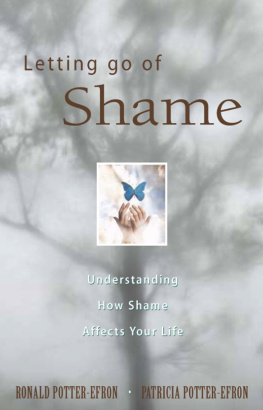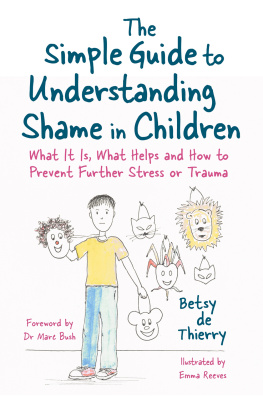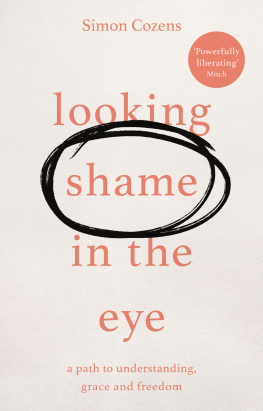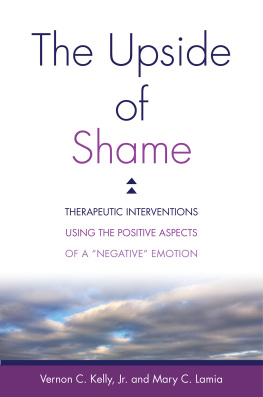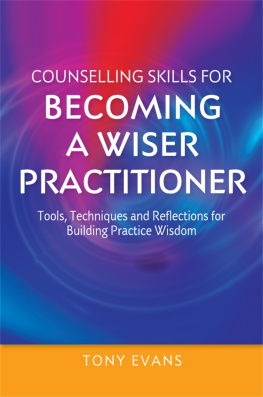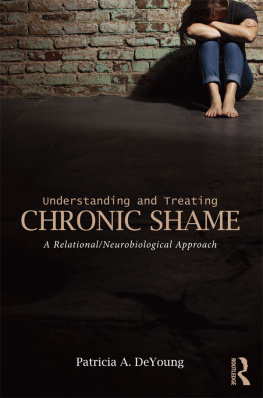Letting Go of
Shame
About the authors:
Dr. Ronald T. Potter-Efron is a clinical psychotherapist. He has a M.S.W. from the University of Michigan and a Ph.D. in sociology from Purdue University. A former university professor, he specializes in the treatment of addictive disorders and anger and resentment counseling. He also is active in training professional counselors. He taught at an experimental college for eight years, and has trained in gestalt therapy techniques.
Patricia S. Potter-Efron is a family systems therapist and an individual and group therapist working mainly with families affected by chemical dependency. A graduate of Macalester College in St. Paul, she now directs Professional Growth Services, a program for adult children with dysfunctional families and does group work with recovering chemically dependent women.
The Potter-Efrons are co-editors of and contributors to The Treatment of Shame and Guilt in Alcoholism Counseling and Aggression, Family Violence, and Chemical Dependency, both published by Haworth Press. Ronald is also the author of Shame, Guilt and Alcoholism: Treatment Issues in Clinical Practice, published by Haworth.
Letting Go of
Shame
Understanding How Shame
Affects Your Life
Ronald Potter-Efron
Patricia Potter-Efron

Hazelden Publishing
Center City, Minnesota 55012-0176
800-328-9000
hazelden.org/bookstore
First published October 1989.
Copyright 1989,
Ronald T. Potter-Efron and Patricia S. Potter-Efron.
All rights reserved. No portion of this publication
may be reproduced in any manner without the written
permission of the publisher.
ISBN-13: 978-0-89486-635-7
ISBN-10: 0-89486-635-4
Ebook ISBN: 978-1-59285-846-0
Library of Congress Catalog Card Number: 89-84784
Printed in the United States of America.
Editors Note:
The stories in this book are composites of many individuals and their dealings with shame. Any resemblance to any one person is purely coincidental.
In the interest of fostering self-respect for each individual, regardless of gender, the authors have alternated gender references in this book switching from he to she. The authors believe the issues of shame know no boundaries in regard to sex, creed, color, or religious affiliation.
Contents
This book is dedicated to the memory of
C. Stanley Potter and Miles J. Efron.
ACKNOWLEDGMENTS
We would like to acknowledge those individuals who read and commented on this text as it gradually took shape: Denise Balduc, Paul Heck, Mark Morse, Jan and Richard Smith, and Lee Webster. Their comments proved quite useful in calling new or overlooked thoughts to our attention. Also, we thank Jennifer Potter-Efron for her excellent typing of the final draft. Judy Delaney was the editor at Hazelden whose enthusiastic support from the start both raised our spirits and kept us working. Finally, we want to share our appreciation for our many friends and associates who contributed their ideas and experiences of shame along with their warmth and caring.
Introduction - A Definition of Shame
Shame is an elusive concept. Although it has been studied periodically since the 1950s, it is far less well understood than its closest neighbor, guilt. Only recently have many books on shame begun to appear.
Some of the reasons for this neglect are historical accidents. For example, Sigmund Freud, the founder of psychoanalysis, happened to focus his attention on guilt rather than shame. Later, anthropologists thought that guilt was a higher level, more sophisticated feeling than shame. They assumed that advanced Western societies did not have or need shame.
Still, probably a better reason for shames elusiveness is peoples natural response to shame experiences: to hide and withdraw. The last thing most deeply shamed persons want to do is to talk about this feeling. They often conceal their shame even during therapy, preferring instead to discuss their anger, sadness, or fears. It is hard to admit feelings of shame. It is equally difficult to face others with that feeling. The result is that individuals become isolated from other people just when they need them the most when they feel most disgraced and ashamed.
What is shame? It is more than a feeling. It is a set of physical responses (such as looking down or blushing) combined with predictable actions (such as hiding or withdrawing from others), uncomfortable thoughts (such as I am a failure in life), and spiritual despair. Our definition of shame is that it is a painful belief in ones basic defectiveness as a human being.
This book is divided into three sections. In the first section, we will attempt to grasp the shame experience by describing it carefully and by contrasting ordinary, constructive shame (shame you can use to improve your life) with the problems of excessive shame. Our basic belief is that shame can be a healthy and useful feeling (although painful). But it can also become unhealthy, especially when someone has too much of it. Deeply shamed persons suffer greatly. They cannot use their shame to improve their lives.
The second section covers the five different sources of shame:
- our genetic and biochemical makeup,
- our American culture,
- our families of origin,
- our current shaming relationships, and
- our own self-shaming thoughts and behaviors.
A person might be affected by any one or more of these influences. The important point is that there is no single source of shame that applies to everybody. Many badly shamed persons grew up with critical and unsupportive parents. Others are more influenced by shaming events in their adulthood, such as being married to a verbally abusive person. Still others shame appears to come from a genetic predisposition, or their shame may reflect cultural bias and discrimination. Finally; certain persons are their own worst shamers. These people relentlessly attack themselves even when others try to support them.
We will learn guidelines for healing shame in the third section. Healing begins with understanding and is followed by action. Healing shame will require us to
- become fully aware of our shame,
- notice our defenses against shame,
- accept a certain amount of shame as part of the human condition,
- challenge shame, and
- set positive goals for ourselves to help replace our shame with self-worth.
When we start healing shame, we will be moving toward humanity, humility, autonomy, and competence. Well be able to say, I am human, no better or worse than others, unique, and good enough as I am.
Exercises for your personal growth are located at the end of each chapter. We think these will be useful for you, particularly if you believe you have a significant problem with shame. Be sure to take your time with these exercises. You may want to begin a notebook where you can write your answers to the exercises, seeing just where shame is in your life and how you can turn bad shame into good shame. It might be a good idea to find someone you trust with whom you can discuss what you write down and think about.
We believe that you who are damaged by your shame can heal. You will need energy, patience, and persistence. You will also need understanding and courage. Above all, you will need hope a deep faith that nobody needs to remain forever in personal despair. People who heal their shame discover they are freer to live lives that center around self-respect, dignity, honor, and realistic pride.

